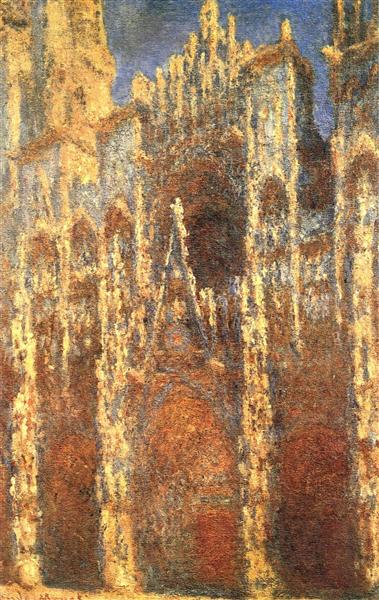Description
Claude Monet’s painting “Rouen Cathedral – The Portal” (1894) is a seminal work of the Impressionist movement that not only captures the artist’s technical mastery but also highlights his deep interest in light, color, and the evanescent atmosphere of visual experience. This canvas is one of a series Monet painted of Rouen Cathedral, in which he explored variations in color and luminosity under different lighting and atmospheric conditions. The cathedral, an emblem of Gothic art, becomes a vehicle for the representation of light and color, concepts essential to Impressionism.
At first glance, the work stands out for its striking use of colour, which flows and unfolds across the canvas in an almost organic manner. Monet gives centrality to the cathedral portal, characterised by a nuance of grey and blue tones that evoke a sense of solidity, in contrast to the bright touches of light that seem to dance across the surface. These plays of light are a testament to the artist’s focus on the changing conditions of the atmosphere; the way light interacts with the structure, transforming the space. The palette is not only a reflection of observed reality, but of the artist’s emotional perception, who strives to capture the essence of an ephemeral moment.
The composition is cleverly structured. The verticality of the cathedral is presented with a majesty that invites the viewer to contemplate both its physical grandeur and its spirituality. Monet severely restricts the presence of human figures, placing them in their architectural context more as shadows than as protagonists. This choice can be interpreted as an invitation to introspection, leading the viewer to a personal meditation on the relationship between man and the sublime.
The treatment of light is perhaps the most fascinating aspect of this work. Monet uses loose, rapid brushstrokes that suggest rather than define, allowing the texture of the oil and the emotion emanating from its application to melt away into a palpable artistic effect. The atmosphere seems to vibrate, captured in time, and is a perfect example of how Monet was able to transcend the simple portrait of a temple by turning it into an immersive visual experience.
Furthermore, this painting is a testament to Monet’s evolutionary process as an artist. Although he began his career influenced by academic painting and realist representation, his style evolved towards a more abstract and subjective approach. In “The Portal,” we find a clear indication of his concern for perception and how it can be modified through the interpretation of color and light. The work anticipates some of the abstract explorations that would characterize later modern art.
The series of paintings of Rouen Cathedral, of which this is one part, reflects Monet's deep interest in climatic conditions and the passage of time, aspects that were always evident in his work. It is interesting to note that the same subject was repeatedly painted at different times of the day and under different conditions, which allows us to compare not only the variations in light, but also the artist's own creative process.
In conclusion, Rouen Cathedral – The Portal is much more than a simple portrait of a building; it is a profound investigation into light and perception, a testament to Impressionism’s quest to capture the fleeting essence of life and nature. The work remains a pillar in the canon of art, inviting both aesthetic admiration and intellectual reflection on the nature of observation and experience. Monet, through this piece, not only documented the beauty of a cathedral, but also bequeathed us a new paradigm of artistic vision that continues to resonate in contemporary practice.
KUADROS ©, a famous painting on your wall.
Hand-made oil painting reproductions, with the quality of professional artists and the distinctive seal of KUADROS ©.
Painting reproduction service with satisfaction guarantee. If you are not completely satisfied with the replica of your painting, we will refund 100% of your money.

